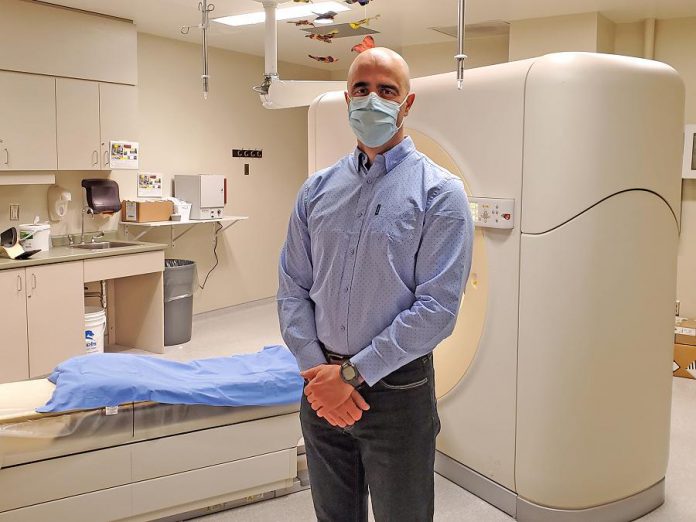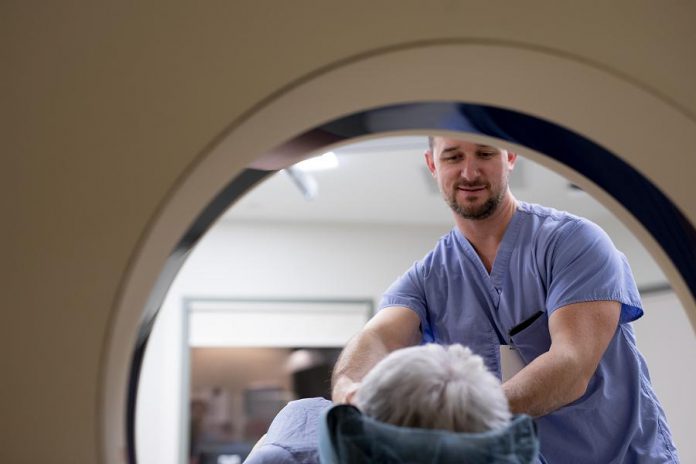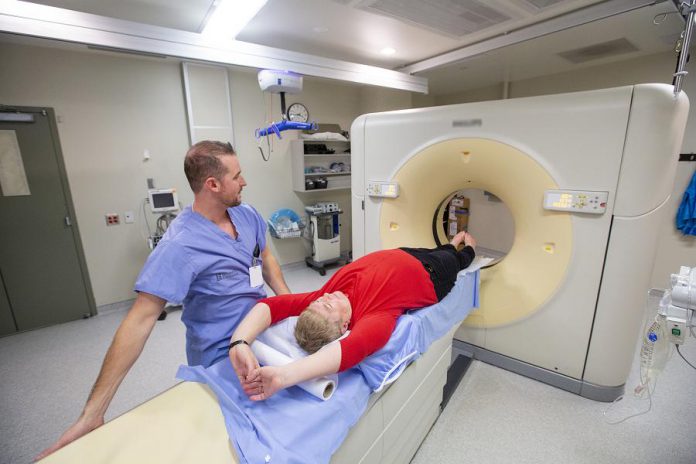
With all the efforts by healthcare professionals at Peterborough Regional Health Centre (PRHC) to care for COVID-19 patients over the past year, we can sometimes forget about the other people whose lives they save every day.
And whether the patient is an accident victim with a head injury, a person who has suffered a stroke, or someone with a serious respiratory infection, there’s one piece of equipment that doctors consider the backbone of patient care — the CT scanner.
At PRHC’s Emergency Department alone, doctors order an average of 35 CT scans every single day — almost half of the 28,000 scans performed at the hospital every year. For many seriously sick or injured patients, when there isn’t a moment to lose, a CT scan means doctors can quickly confirm a diagnosis and begin lifesaving treatment.
“CT stands for computed tomography,” says PRHC radiologist Dr. Mario Voros, explaining a CT scan involves a series of X-ray images taken from different angles around a patient’s body. Computer processing then combines these images into a cross-sectional view of the patient’s bones, blood vessels, and soft tissues.
“It’s a more powerful, dynamic, moving, three-dimensional type of X-ray,” Dr. Voros adds. “Some of the issues doctors can use CT scans to examine include brain bleeds, blockages in arteries, chest blood clots, appendicitis, kidney stones, and fractures, among many conditions. They are also used in cancer care and for stroke assessment.”
Skilled radiologists like Dr. Voros use CT scans to confirm a diagnosis. In a medical emergency, they can see the scanned images within minutes — minutes that can sometimes mean the difference between life and death for a patient.

But the existing CT scanners at PRHC are now more than 12 years old and must soon be replaced. The PRHC Foundation is reaching out to community donors to help the hospital purchase two new cutting-edge CT scanners.
Dr. Voros points out the technology behind CT scanners has vastly improved over the past decade, so replacing PRHC’s existing scanners is an “exciting opportunity” to support world-class patient care at Peterborough’s regional hospital.
“The new CT technology is faster, making it possible to scan a patient’s entire body in a matter of seconds,” he explains. “It also provides higher quality imaging, giving doctors clearer and more reliable pictures of what’s happening inside a patient’s body.”
Dr. Voros uses the example of elderly patients who have decreased bone density. He says it can be difficult for doctors to discern a subtle fracture using the existing CT scanners. However, the new CT scanners will provide PRHC’s radiologists with higher-resolution images that highlight potential areas of concern.
He points out another significant benefit of the new CT technology: it emits less radiation, which means less risk for a patient.
“This is particularly beneficial for patients with cancer or chronic illnesses who have repeat CT scans,” Dr. Voros says.
He explains a CT scan of a patient’s chest using the new technology requires the same amount of radiation as a routine chest X-ray — but delivers a much higher quality and more informative image for diagnosing the patient’s condition.

“Many people don’t realize the government doesn’t fund hospital equipment or technology,” says Lesley Heighway, President and CEO of the PRHC Foundation. “That’s why the most generous communities have the best hospitals.”
Your gift to the PRHC Foundation will make it possible for the hospital to invest in two state-of-the-art CT scanners, considered the best on the market.
There aren’t many hospitals outside of a handful of Canada’s largest city centres that have this technology right now. That means acquiring the new scanners will improve diagnostic imaging for the thousands of patients from across our region who will be scanned as part of their care at Peterborough Regional Health Centre.
“These new CT scanners are critical to supporting world-class patient care in our growing and changing region, both now and well into the future,” Dr. Voros says.
You can help fund lifesaving equipment at PRHC by donating to the PRHC Foundation online at prhcfoundation.ca or by calling 705-876-5000.
Along with a donation, you can also include a message of thanks for PRHC’s frontline healthcare professionals like Dr. Voros, who are always here for us when it matters most. The Foundation will pass those messages along to the doctors, nurses and staff who’ve been honoured, letting them know we’re here for them too.
This story was created in partnership with the Peterborough Regional Health Centre Foundation.



























